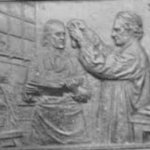Reliable medicines
Return to the other descriptions of homeopathy

Reliable test results
Without reliable testing, consistent treatment results would be impossible. Homeopaths are constantly trying to increase the reliability of their remedy choices. Medicine test results are the most reliable form of evidence that a remedy will heal a specific individual's symptoms. Reliable tests are the strong backbone of homeopathic treatment.
However, the reliability of these test results is based on the analytical ability and judgment of the person who runs the tests. Two hundred years of clinical practice have shown that the model tester was the founder of homeopathy, Samuel Hahnemann. His results are the standard for the profession.

testing Standards
Unlike typical medical science, homeopaths test medicines on healthy people. Prior to the test, the tests find out about the test subjects mental and physical conditions. Then, they look for changes after administering the test remedy on healthy subjects. Testing may continue for weeks or months. It is important that the test subject does not know the medicine. Recently, placebos are given also and testers do not know what they are testing. But, for the practical purpose of discovering reliable test results, that scientific safeguard is unimportant. This is because homeopathic medicine testing is designed to test how test subjects respond and if they respond. Subjects who are insensitive to the test material are irrelevant to the test results. Unlike typical medical tests, these tests are not to prove that the remedy heals a particular symptom. Rather they discover the symptoms that occur in sensitive subjects. Individuals respond to varying degrees and some do not respond at all. In summary, testing in homeopathy focuses on subtle response to the test material and is not a test of medical efficacy.
As mentioned above, the tester's ability to observe and interview the subject and then later to analyze the resulting data is the foundation of reliable results. The reliability of tester becomes evident as their findings are used in clinical practice. Long after their death, the results of their tests are building a reputation.
Also, the large numbers of test subjects that are used in medical science are not needed in homeopathic testing. Rather, subjects who are able to clearly communicate their mental and physical health produce better test results. As time progresses, sensitive testers produce stronger symptoms. Testers who are insensitive to the remedy produce no symptoms. If such "dud" testing subjects were patients, they also could not be healed by the tested remedy.
Limitations to testing results
Testing produces a limited range of symptoms. The most subtle reactions do not occur in testing. That is, the deeper social and psychological characteristics of patients who might be cured by the test medicine do not appear in tests. Testing symptoms are more superficial than what is observed during clinical use of the tested medicine.
Note that testing symptoms are only temporary. Testers are not harmed by testing. They are not harmed because of the extreme dilution of testing materials, also their exposure to test materials is short. Because test subjects are not harmed, healthy subjects are willing to undergo testing.
Healthy testing is also a limitation. Major organ deterioration is never observed in testing. Therefore, many other sources of information concerning the pathological effects of homeopathic medicines are used. For example, the severe physical reactions to poisons are at first studied through a pathologist's reports of poisoning. Even toxic materials can be highly diluted and therefore, safely tested. However, even with high dilutions, epidemic disease cells, or pathologies such as cancer cannot be tested using the above methods.
Value of non-testing data
Thus, in addition to testing symptoms, (proving symptoms), clinically observed conditions are extremely important. Again, the sensitivity of the clinician determines the value of clinical data. Today, both the tester's and the clinician's names are shown in the computer records of remedy descriptions. Also, when researching curative remedies, it is possible to limit information to the most reliable sources.
All homeopaths agree that the tests of certain remedies are highly reliable. Furthermore, those classical medicines cover most common current medical conditions. They are as reliable as they were 200 years ago.
Current Trends
Nevertheless, to meet current medical needs, modern homeopaths use the backbone data of the most reliable tests as models to re-test some medicines. They also research ways to use modern technology to use testing and clinical data to meet current needs. For example, drugs such as antibiotics, steroid and hormone treatment cause medical complications that did not exist in the past. Because current medical conditions have changed since Hahnemann's time 200 years ago, many modern homeopaths look for other reliable ways to counter-test remedies.
Research flexibility
The research that is necessary to select a curative medicine is much like a healthy spine. It must be strong and flexible. Following this metaphor, clinic studies are similar to the blind man. Only by only feeling the bumps on the elephant's back, the blind man cannot imagine the structure of the elephant's spine. To a beginner in homeopathy, my description of reliable information about medicine must feel like those bumps. The homeopathy has a strong structure that professional homeopaths manipulate because they know that the structure is flexible.

